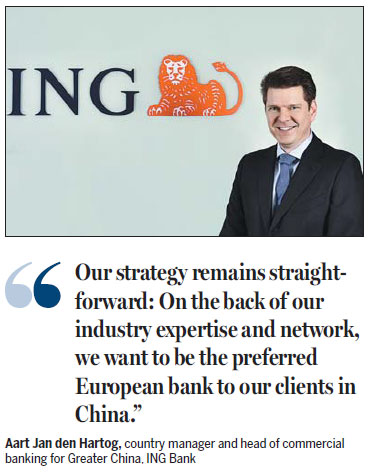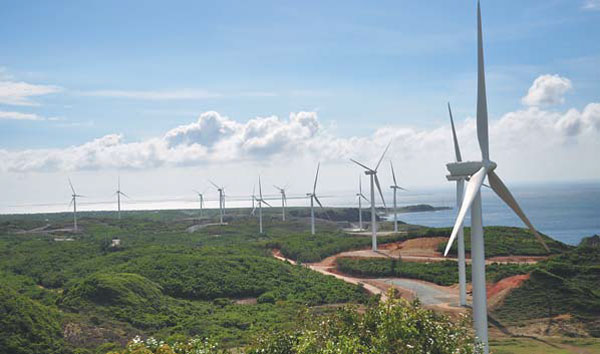Expanding ING in China 'for the long haul'
Updated: 2015-10-27 07:40
(China Daily)
|
|||||||||||
|
ING Bank is part of a group that financed the Burgos Wind Farm in the Philippines, picked last year as the Asia-Pacific Renewables Deal of the Year by Project Finance International. Provided to China Daily |
Bank envisions great potential in Belt and Road Initiative and AIIB
The Netherlands-based ING Bank recently upgraded its presence in Beijing to a full-service branch. Country manager and head of commercial banking for Greater China Aart Jan den Hartog talked with China Daily about how ING aims to support local and international companies' growth plans alongside initiatives such as the Belt and Road.
Why did you expand your presence in Beijing?
ING is a global financial institution with a strong European base and an international network across more than 40 countries. ING is ranked seventh among the top 20 European financial institutions. For our commercial banking business, we have a solid footing and a mandate to grow our international business. Asia is an important part of this international franchise and China continues to play a major role in our international strategy.
Upgrading the ING Beijing representative office into a branch is therefore a logical and timely next step. It offers our Beijing-based clients access to more products and services and allows ING to serve more clients. It is also a testament to the fact that ING is positive about China's growth prospects and that we are here for the long haul.
Who are your clients and what do you offer them?
We serve about 250 clients in China. These are sizeable corporate and institutional clients with business operations in different countries. We offer them a global franchise and specialized sector expertise.
Our global franchise includes locally incorporated banks in key European markets such as the Benelux (Belgium, the Netherlands and Luxembourg) region and Germany, where we have a leading position, as well as Poland, Romania, Turkey, Italy, France and Spain. In the Asia-Pacific region we are active in 14 markets, including Australia and Southeast Asian countries. Somewhat closer to home, in China, we are present in Shanghai, Beijing, Hong Kong and Taipei.
We generate ideas, provide advice and deliver flawless execution in areas that we specialize in. Globally we are among the top 10 in sector financing, especially in infrastructure, telecommunications, media and technology, transportation and natural resources, among others. We are also among the top three in trade and commodity finance.
Having people on the ground with specific expertise in our clients' line of business means we are able to help them realize their ambitions and bridge geographies and cultures. For instance, one of our Asian clients was considering buying a commercial office property in a gateway city in Europe. They needed the local financing to be closed at very short notice but did not have people on the ground. Time was pressing. They turned to us and we managed to close the deal within a few weeks because our real estate finance team in the location knew the property and our team in Asia knew the client's needs well.
This shows the value of ING's network for our clients and how we can empower our clients to stay a step ahead in business. ING operates as a globally connected network across 40 countries - we therefore have a lot to offer our clients.
Are you seeing a change in your clients' needs?
Our clients are growing but fundamentally, they are still looking for a bank that not only provides a truly global network but also understands their business and supports them with ideas and solutions that add value.
For example, we see that clients are increasingly diversifying their payment and cash management - or PCM - providers. Instead of a single provider per location they are now looking for PCM providers per region. This trend plays to our strength due to our strong network in Europe and services as a universal bank in many parts of the continent.
What are the trends you see in the market and how will these affect your strategies?
Despite the slowdown in China's economy, it is still expected to grow at 6-7 percent, driven by strong market fundamentals. What we need to remember is that the Chinese economy today is much larger and the current growth represents more economic output compared to, for example, the 14-percent growth in 2007. At the same time, a few market trends are gaining momentum and could contribute to China's growth.
First, we see huge potential in the Belt and Road Initiative. The two routes - the Silk Road Economic Belt and the 21st Century Maritime Silk Road - will cover more than 60 countries. It is estimated that the countries along the routes account for about 60 percent of the world's population, and around 29 percent of the world's GDP. Infrastructure development along the routes will increase and related industries such as machineries and natural resources would benefit from the infrastructure development. Clearly, cross-border trade is also set to increase.
Second, the establishment of the Asian Infrastructure Investment Bank also presents significant opportunities favoring the creation of capital as well as systematic and sustainable growth. All of these are strong indicators of solid opportunities for cross-border business and multilateral investment in the region.
China in recent years has emerged as a powerhouse in cross-border mergers and acquisitions. Europe received the largest share of China's foreign M&A investment with the total value in deals tripling from $4.1 billion in 2013 to $13.5 billion in 2014.
Our strategy remains straightforward: On the back of our industry expertise and network, we want to be the preferred European bank to our clients in China and from China. This is a long-term strategy that is not going to change and that we are going to build on to capture the growth opportunities in the country.
How is ING going to tap the opportunities presented by the Belt and Road Initiative?
ING is present in 20 countries along the Belt and Road. Our teams on the ground can support our clients in the entire process, across borders and cultures. Our focus is to provide effective advice and ensure transparent and timely execution in order to allow our clients to stay one step ahead in business.
We are also established sector specialists, with strong expertise in trade and commodity finance, telecommunications, media and technology, transportation, natural resources, utilities and infrastructure, among others, many of which are earmarked for development along the routes.
What are the areas of cooperation for China and the Netherlands?
The Netherlands has been China's second-largest trade partner in the EU for the last 11 years and is seen as the "gateway" to Europe. At the same time, China has become the fourth-most important export destination for the Netherlands (in value added terms) since 2012, a jump from thirteenth-most important destination in 1995. Dutch exports, particularly for technical industries, as well as agricultural food products to China have seen high growth over recent years.
It is safe to say that the Netherlands is more than a node within a network; it is a key hub for Chinese businesses keen to expand globally. There are definitely many more opportunities for cooperation between the two countries in the future.

(China Daily 10/27/2015 page7)
Today's Top News
Over 200 dead as huge earthquake shakes S. Asia
British pub becomes tourist attraction after Xi's visit
King's visit to boost partnership: Dutch FM
Balkan, EU leaders agree to coordinate on migrants
Hospitality creates trip to remember
Xi appeals for Sino-British soccer boost
Sino-UK 'global' partnership sealed with declaration
Inmarsat Plc agrees strategic partnership with China
Hot Topics
Lunar probe , China growth forecasts, Emission rules get tougher, China seen through 'colored lens', International board,
Editor's Picks

|

|

|

|

|

|







